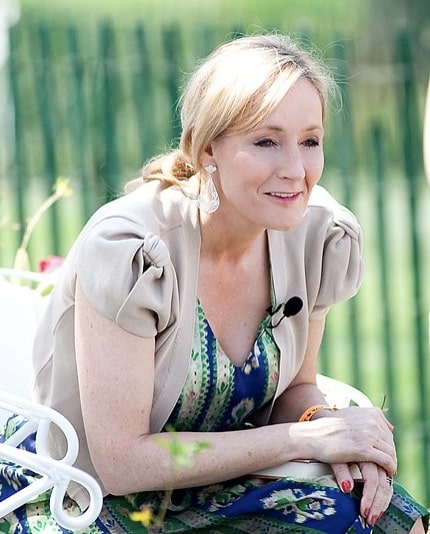
Absolutely! In researching biographies of more than 500 of the world’s highest achievers, I have discovered that many of the world’s richest people came from very little wealth, equipped with nothing more than a high capacity for work and a dream that they pursued with an intense, unrelenting passion. A few clips from three of the micro biographies I have written are given below as examples of those who achieved fame and fortune with little more than a dream and intense work.
The first person I will profile is J. K. Rowling, because today, July 31, is her 59th birthday. After graduating with a BA in 1987, with average grades, she worked in various jobs, including as a researcher and bilingual secretary for Amnesty International, a human rights organization. Then, one day in 1990, on a delayed train ride from Manchester to London, the details of the characters in a novel for children came to Rowling as if unfolding in a dream. On reaching her flat, she began to record all the elements of that dream in a narrative that would change the world of children’s literature. Over the next five years, she mapped out the entire story and its magical world. During this period, she faced personal challenges, including the death of her mother and a divorce from her husband.
Rowling’s manuscript for “Harry Potter and the Philosopher’s Stone” (titled “Harry Potter and the Sorcerer’s Stone” in the US) was rejected by several publishers before its acceptance by Bloomsbury in 1996. The book was released in 1997, under her pen name J.K. Rowling. The success of the first book was unprecedented, and the subsequent books in the series gained even more popularity. She became a self-made extremely wealthy individual, combining hard work with a passionate interest.
James Paul McCartney was born on June 18, 1942 into a musical family in Liverpool, England. His father, James McCartney was a jazz pianist and trumpeter. At a very early age, James Paul, who became known as “Paul”, showed an interest in music and taught himself to play the piano, guitar and trumpet.
In 1953, at the age of 11, Paul enrolled at the Liverpool Institute where he attended classes. The next year, during a bus ride to school, Paul met George Harrison, who would become the lead guitarist in his musical group in the years ahead. The rock and roll music craze that seized the American youth in the mid-1950’s swept across the Atlantic Ocean and reached a generation of English teenagers, among them Paul McCartney. On Paul’s 14th birthday in 1956, his father gave him his nickel-plated trumpet that Paul promptly traded for an acoustic guitar. It was on this guitar that he composed and sang his first compositions, one of which would become the famous, When I’m Sixty-Four.
On July 6, 1957, Paul met John Lennon who had a band known as the Quarrymen that played a variety of musical genres including rock and roll, jazz, and blues. Paul joined the Quarrymen as a rhythm guitarist and in the following year, George Harrison joined the group as the lead guitarist. By August 1960, the group had added Stuart Sutcliffe on bass and Pete Best (later replaced by Ringo Starr) as the drummer forming the group that became known as the Beatles.
In January 1962, Brian Epstein became the manager for the Beatles and 9 months later the Beatles had their first hit titled Love Me Do, that crossed the Atlantic to America. This was followed by a flurry of hits co-written by McCartney and Lennon, including I Saw Her Standing There, She Loves You, I Want to Hold Your Hand and Can’t Buy Me Love. These launched the craze known as “Beatlemania” that supplanted the American rock and roll of the 50’s with a new era in popular music. Paul and the other Beatles became extremely wealthy through hard work, and their passion for creating music.
Sir Richard Branson was born on July 18, 1950, in London, England. Although speech came to him at an early age, he was slow in acquiring written language, confessing in an interview with The Times, London, “At school I was dyslexic and a dunce.” His academic performance was poor and when he decided to leave school at age 16, the headmaster of Stowe School, Robert Drayson, presciently observed, “You will either end up in prison, or become a millionaire.”
In 1984, he was booked on a flight from Puerto Rico to the British Virgin Islands where he was to meet with his future wife Joan Templeman. When the flight was canceled, he and several hundred passengers were stranded in the small island airport. Perceiving an opportunity, he scouted by telephone for a charter flight and paid the total cost up front. He then canvassed the stranded passengers, offering them tickets to the British Virgin Islands for $39 each. This covered his costs and sowed the seeds for the creation of Virgin Atlantic Airlines a few months later.
Such was the risk-taking approach that characterized Branson’s many ventures, culminating in an empire of companies under the umbrella called the Virgin Group. His motto was, “You’ve got to take risks if you’re going to succeed. I would much rather ask forgiveness than permission.” This approach brought him fame and a net worth of $4.6B qualifying him as 589th wealthiest billionaire in the Forbes’ 2021 ranking of the richest people in the world.
Certainly, there are many people of average IQ who work extremely hard and do not achieve great wealth or fame. However, those who come from great wealth often face greater barriers to high achievement, because the incentives for achievement are often lacking when money is already available. Those of high IQ are often uninterested in accumulating great wealth, so the field is wide open. As the old adage advises, “There’s lots of room at the top.”– however you define the “top.”
